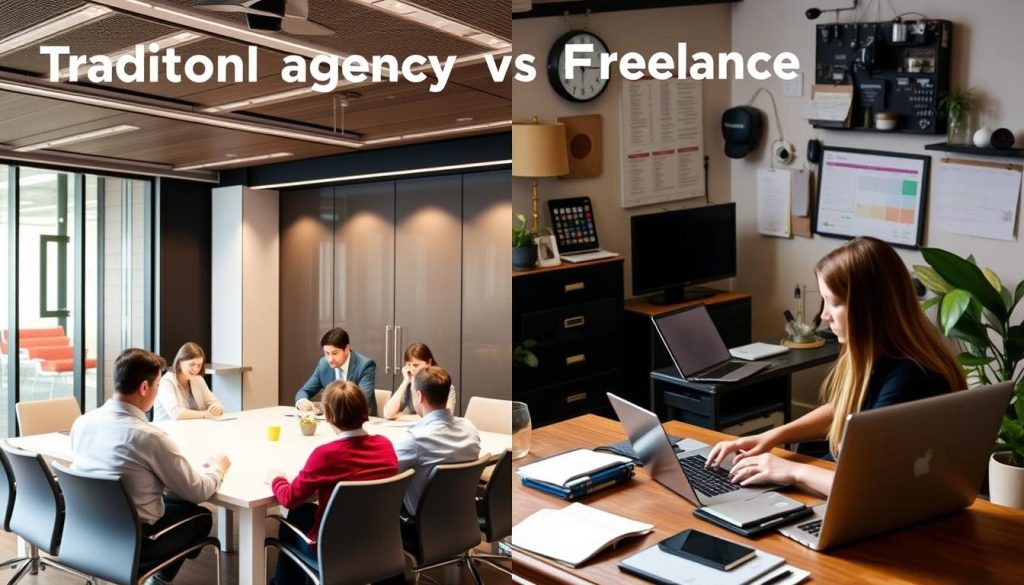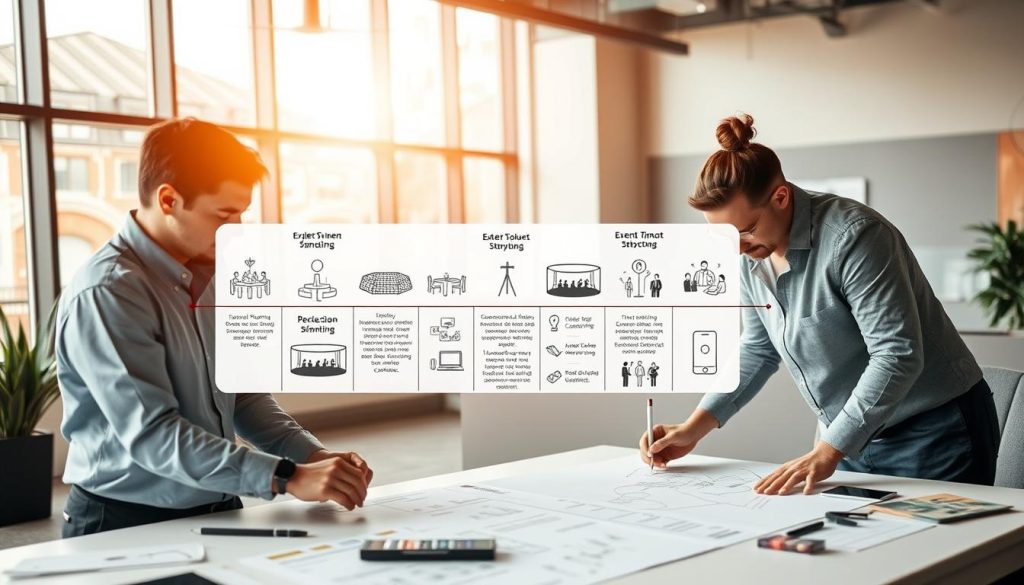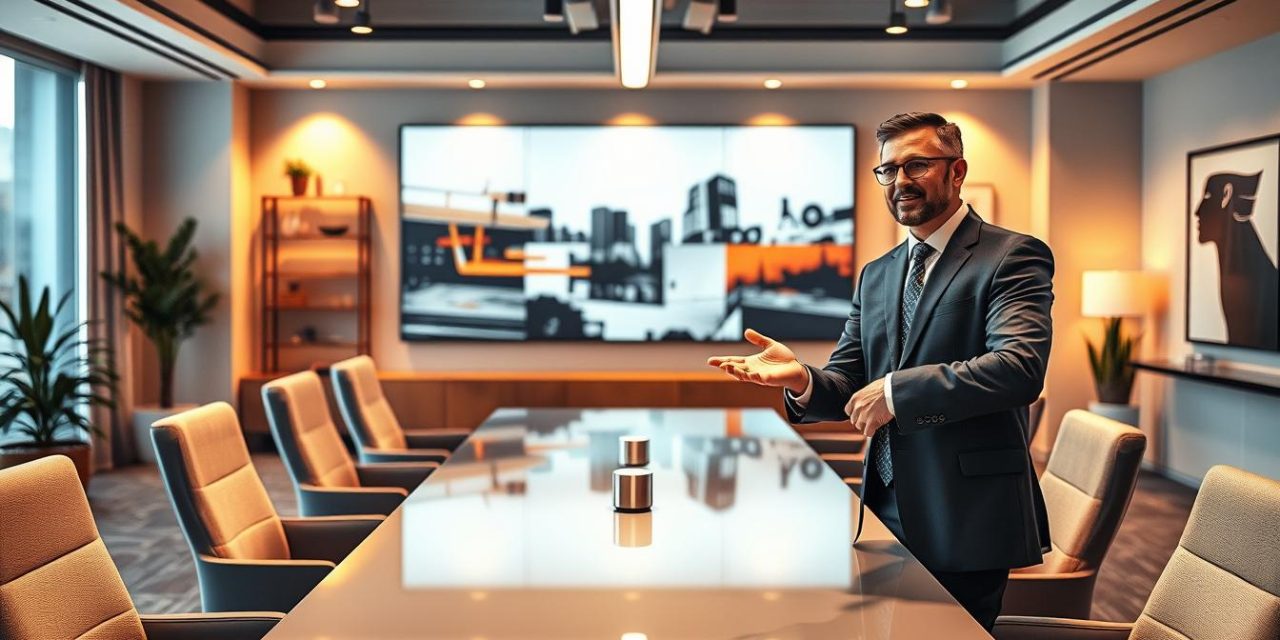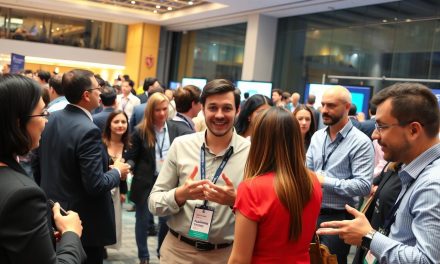Corporate gatherings in France demand exceptional organization and creative vision. Many businesses now prefer working with independent professionals rather than traditional agencies. This shift offers personalized attention and significant cost savings.
From conferences to team-building activities, professional coordination ensures every detail shines. These specialists handle logistics, suppliers, and guest experiences with precision. They bring fresh ideas and innovative approaches to each project.
The French market requires cultural understanding and local expertise. Independent professionals deliver this while maintaining your company’s unique vision. Their skills in project management turn complex plans into successful events.
Platforms like EventWork.com connect businesses with qualified professionals. This approach offers flexibility and access to diverse talent. It creates wonderful opportunities for memorable corporate experiences.
Table of Contents
Key Takeaways
- Independent professionals offer personalized service and cost-effective solutions for corporate events
- Cultural understanding and local expertise are crucial for successful events in France
- Professional coordination handles all aspects from logistics to guest experience
- Digital platforms provide access to qualified professionals with diverse skills
- Fresh ideas and innovative approaches enhance corporate gathering experiences
- Project management skills ensure complex events run smoothly and successfully
- Flexibility and personalized attention make independent professionals a popular choice
Understanding the Role of a Freelance Event Coordinator
Independent professionals bring a special touch to corporate gatherings that traditional agencies often miss. They combine creative vision with practical execution skills. This unique blend creates memorable experiences for companies and their guests.
What Exactly Does a Freelance Event Coordinator Do?
These professionals handle every aspect of your corporate function. They transform your vision into reality through careful planning and execution. Their work begins long before the actual gathering date.
According to French market data, these specialists average 8 years of experience. They manage various activities including soirées, apéritifs, and professional conferences. Their expertise covers both business and social elements.
These coordinators typically work with diverse teams including:
- DJ professionals and musical animators
- Presenters and hostesses
- Technical crews and catering staff
- Musicians and entertainment specialists
Their primary goal is creating meaningful connections between companies and audiences. They help deliver key messages while ensuring everyone enjoys the experience.
Key Responsibilities in Corporate Event Management
These professionals handle comprehensive turnkey solutions for businesses. They manage everything from initial concept to final execution. Their services create seamless experiences for all participants.
Specific tasks include rhythm definition and animation planning. They ensure each moment flows naturally into the next. This careful timing keeps guests engaged throughout the function.
Preparation work involves both festive and professional elements. They coordinate with suppliers and manage logistics behind the scenes. Their attention to detail makes gatherings truly unforgettable.
These specialists also focus on relationship building and prospect generation. Well-executed corporate functions often lead to new business opportunities. They help companies strengthen client relationships through shared experiences.
The difference from personal event planning lies in strategic objectives. Corporate gatherings serve business purposes beyond simple entertainment. These professionals understand how to balance both aspects perfectly.
Why Choose a Freelance Event Coordinator Over Traditional Agencies
Traditional event agencies often operate with rigid structures, while independent specialists bring adaptable solutions to corporate planning. This modern approach transforms how businesses handle their important gatherings and celebrations.

Many companies find that working directly with professionals offers significant advantages. The personal touch and dedicated attention make a noticeable difference in results.
Flexibility and Personalized Attention
Independent professionals provide exceptional adaptability for your corporate needs. They adjust their approach based on your specific requirements and timeline.
You receive direct communication with the person managing your project. This eliminates layers of bureaucracy common in traditional agencies.
These specialists offer customized service that aligns perfectly with your vision. They focus entirely on your success rather than managing multiple clients simultaneously.
Platforms like EventWork.com make connecting with talent incredibly simple. Businesses can post opportunities within minutes and receive detailed profiles.
The platform connects you with diverse professionals including:
- Technical experts and decor specialists
- Stage construction professionals
- Entertainment and speaking talent
- Logistics and planning specialists
Cost-Effective Solutions for Your Events
Working with independent professionals typically saves companies substantial resources. You avoid agency markup and overhead costs that inflate traditional pricing.
Many platforms operate without commission fees between clients and professionals. This direct relationship benefits both parties financially.
You pay only for the specific services and hours you actually need. There’s no requirement to purchase bundled packages or unnecessary extras.
The revolutionary approach eliminates traditional hiring barriers. Companies can access top talent without lengthy procurement processes.
This model provides exceptional value while maintaining quality standards. Your budget achieves more when working directly with dedicated specialists.
Essential Skills Every Professional Freelance Event Coordinator Possesses
Successful corporate gatherings require a unique blend of technical mastery and creative thinking. Professionals in this field combine practical abilities with interpersonal strengths. Their comprehensive skill set transforms business visions into memorable experiences.
Logistical Expertise and Planning Capabilities
Exceptional logistics management forms the foundation of every successful gathering. These specialists handle complex details with precision and foresight. They create detailed timelines that keep everything on track.
Their planning skills cover venue selection, transportation, and technical requirements. They coordinate with multiple suppliers simultaneously. This ensures smooth execution from start to finish.
French professionals particularly excel at local venue knowledge. They understand regional regulations and cultural preferences. This expertise prevents potential issues before they arise.
Creativity and Innovation in Event Design
Creative vision separates ordinary gatherings from extraordinary experiences. These professionals translate company themes into engaging activities. They design environments that captivate and inspire guests.
Innovation appears in every aspect from decor to entertainment choices. Fresh ideas make each gathering unique and memorable. This creative approach reinforces brand messages effectively.
Dynamic personalities thrive in this fast-paced environment. They adapt quickly to changing circumstances and client requests. Their flexibility ensures successful outcomes despite challenges.
Communication and Relationship Building
Strong relational skills are essential for working with diverse teams. Professionals communicate clearly with clients, suppliers, and guests. They build trust through consistent performance and transparency.
Excellent presentation abilities help them represent client brands effectively. They interact positively with all event participants. This creates welcoming atmospheres that encourage networking.
These specialists identify company expectations accurately. They translate business objectives into appropriate experiences. Their understanding of audience dynamics ensures everyone feels valued.
Relationship building extends beyond the gathering itself. Many professionals develop long-term partnerships with clients. This leads to ongoing opportunities for future collaborations.
Types of Corporate Events a Freelance Coordinator Can Manage
Modern businesses host various gatherings that require specialized expertise. Professionals handle everything from formal conferences to creative team activities. Each type demands unique approaches and specific skill sets.

These specialists manage diverse corporate functions across France. They adapt their methods to match each gathering’s purpose. Their versatility makes them valuable partners for companies.
Conferences and Professional Forums
Large professional meetings need careful organization and technical precision. Specialists coordinate venue selection, speaker arrangements, and attendee registration. They ensure smooth information flow throughout the program.
Technical requirements include audio-visual equipment and stage setups. These professionals manage simultaneous sessions and networking breaks. They create environments that encourage learning and professional exchange.
French business forums often incorporate local cultural elements. Professionals understand regional preferences and communication styles. This knowledge enhances the overall attendee experience.
Product Launches and Brand Activations
Introducing new offerings requires creative presentation and strategic timing. Specialists develop memorable reveals that generate excitement. They coordinate media coverage and guest interactions seamlessly.
Brand activation events create lasting impressions on target audiences. Professionals design immersive experiences that reflect company values. They manage every detail from decor to demonstration areas.
These gatherings often involve complex technical installations. Specialists ensure proper equipment setup and operational testing. Their planning prevents last-minute issues during critical moments.
Team Building Activities and Corporate Retreats
Internal company gatherings focus on relationship building and morale boosting. Professionals design activities that encourage collaboration and trust. They create safe spaces for colleagues to connect personally.
Corporate retreats combine work sessions with recreational elements. Specialists balance productivity with relaxation appropriately. They select locations that support both business and social objectives.
Animation teams typically include various entertainment professionals:
| Event Type | Common Team Members | Key Responsibilities |
|---|---|---|
| Gala Evenings | DJs, Musicians, Hostesses | Entertainment, Guest Guidance, Atmosphere Creation |
| Product Launches | Presenters, Technicians, Caterers | Demonstrations, Equipment Management, Hospitality |
| Team Building | Activity Leaders, Facilitators | Group Dynamics, Challenge Coordination |
| Professional Conferences | Stage Managers, Audio Technicians | Speaker Support, Technical Operations |
Company anniversary celebrations mark important milestones with style. Professionals incorporate historical elements while looking toward the future. They create events that honor tradition while inspiring innovation.
Inauguration ceremonies require formal yet welcoming atmospheres. Specialists manage protocol elements while maintaining genuine warmth. They ensure these significant moments proceed flawlessly.
Each event type demands specific approaches and team compositions. Professionals adapt their management style to suit each gathering’s purpose. Their flexibility ensures successful outcomes across diverse corporate functions.
How to Find the Right Freelance Event Coordinator for Your Needs
Finding the perfect professional for your corporate gathering requires careful evaluation. You want someone who understands your vision and can execute it flawlessly. The selection process involves reviewing past work and verifying client satisfaction.
Platforms like EventWork.com make discovery simple with detailed profiles. These platforms showcase professionals with various specializations. You can filter candidates based on your specific requirements.
Look for specialists who match your event type and company culture. The right professional brings both technical skills and creative thinking. Their approach should align with your business objectives.
Reviewing Portfolios and Past Event Examples
Portfolios reveal a professional’s style and capabilities. Examine examples similar to your planned gathering. Look for diversity in their past projects.
Pay attention to creativity in problem-solving and design. Strong portfolios show adaptability across different event types. They demonstrate consistency in delivering quality results.
Key elements to evaluate in any portfolio:
| Portfolio Element | What to Look For | Why It Matters |
|---|---|---|
| Event Photography | Guest engagement, decor details, overall atmosphere | Shows attention to visual elements and guest experience |
| Project Descriptions | Scope, challenges, solutions implemented | Demonstrates problem-solving abilities |
| Client Industries | Variety or specialization in your sector | Indicates relevant experience for your needs |
| Creative Elements | Unique themes, innovative setups, custom details | Reveals creativity and personalization skills |
| Technical Execution | Stage setups, lighting, audio quality | Shows technical proficiency and planning |
Assess whether their style matches your company’s image. Some professionals excel at formal conferences while others shine at creative activations. Choose someone whose strengths align with your event goals.
Checking References and Client Testimonials
Client feedback provides valuable insights into real-world performance. Look for testimonials that mention specific strengths and achievements. Genuine reviews often include detailed examples.
Contact references directly when possible. Prepare questions about communication style and reliability. Ask about their experience working with the professional.
Platform references typically include:
- Completed projects and client ratings
- Response time and communication metrics
- Repeat client percentages
- Specific skill endorsements
Evaluate testimonials for authenticity and relevance. Look for patterns in feedback across multiple clients. Consistent praise in certain areas indicates core strengths.
Pay attention to how professionals handle challenges mentioned in reviews. The best specialists turn obstacles into successes. Their problem-solving abilities often distinguish them from others.
Matching specialist experience with your specific needs ensures better outcomes. The right professional brings both expertise and enthusiasm to your project. Their track record should inspire confidence in their abilities.
Evaluating Experience and Expertise in Event Logistics
Logistics form the backbone of any successful corporate gathering. The right professional brings both knowledge and practical skills to manage complex details. Their expertise ensures everything runs smoothly from start to finish.
When evaluating candidates, focus on their process and past achievements. Look for professionals who demonstrate strong organizational abilities. Their approach should show clarity and reliability.

Ask specific questions about their methods and problem-solving techniques. Their answers reveal depth of experience and adaptability. This helps you identify the best match for your project.
Assessing Their Process for Vendor Management
Strong vendor relationships are crucial for successful gatherings. Professionals should demonstrate clear communication with suppliers. They must coordinate multiple teams effectively.
Look for evidence of positive partnerships in their past work. Check how they handle challenges with catering or technical services. Their ability to maintain good relationships ensures better results.
Key evaluation points include:
- Communication methods with various service providers
- Problem resolution strategies during previous gatherings
- Quality control processes for delivered services
- Budget management when working with multiple suppliers
Their approach should show respect for local French business customs. Understanding regional preferences makes a significant difference. This cultural awareness prevents misunderstandings.
Understanding Their Approach to Timeline Creation
Effective scheduling separates amateurs from true professionals. The best specialists create detailed timelines with built-in flexibility. They account for potential delays while maintaining overall structure.
Ask about their methods for developing realistic schedules. Look for examples of how they handle last-minute changes. Their contingency planning shows true expertise.
Reliable professionals use proven project management techniques. They break large tasks into manageable steps. This systematic approach prevents overlooked details.
Evaluate their time management skills through specific questions:
- How they allocate time for setup and testing
- Their process for coordinating multiple activities simultaneously
- Methods for communicating schedule changes to all team members
- Approach to balancing perfection with practical time constraints
Their answers should demonstrate logical thinking and experience. The right professional makes complex scheduling look effortless.
Always request examples from gatherings similar to yours in scale. Compare their approach to your specific needs. This ensures they can handle your project’s unique requirements.
Remember that the best professionals learn from each experience. They continuously improve their methods while maintaining core reliability. This growth mindset benefits your current and future gatherings.
The Initial Consultation: Setting Your Event Up for Success
Your first meeting with a potential specialist lays the foundation for everything that follows. This conversation builds trust and clarifies the path forward. Approach it as a collaborative discussion rather than an interview.
Both parties should come prepared with relevant information and questions. This ensures productive dialogue about your vision and their capabilities. The right professional will make you feel confident about their approach.
Key Information to Share During Your First Meeting
Begin by clearly explaining your gathering’s purpose and desired atmosphere. Share your company’s background and what makes your team unique. This context helps the specialist understand your culture.
Provide these essential details to ensure productive discussions:
- Gathering objectives and measurable success criteria
- Preferred dates and potential backup options
- Approximate guest count and demographic information
- Budget range and allocation priorities
- Venue preferences or already secured locations
- Any special requirements or accessibility needs
- Preferred themes or stylistic directions
- Key stakeholders and decision-makers involved
Be transparent about your expectations and constraints. This honesty allows the professional to assess feasibility accurately. It also demonstrates your seriousness about the project.
Share examples of gatherings you’ve enjoyed or found effective. These references help communicate your taste and standards. They provide concrete examples rather than abstract descriptions.
Questions to Ask Your Potential Event Coordinator
Prepare thoughtful questions that reveal their approach and compatibility. Focus on their process rather than just past achievements. Their answers should demonstrate strategic thinking and adaptability.
Essential questions to include in your discussion:
- How do you typically structure your planning process?
- What communication methods do you prefer with clients?
- How do you handle unexpected challenges during gatherings?
- Can you describe your experience with similar projects?
- What is your approach to budget management and tracking?
- How do you coordinate with various suppliers and vendors?
- What metrics do you use to measure gathering success?
- How do you incorporate client feedback during planning?
Listen for specific examples rather than general statements. The best professionals will share concrete stories from past experiences. Their enthusiasm for problem-solving should shine through.
Pay attention to how they ask questions about your needs. Active listening demonstrates genuine interest in your project. It shows they’re already thinking about solutions.
Notice their responsiveness to your concerns and ideas. The right partnership feels collaborative from the very beginning. Trust your instincts about personal chemistry and professional alignment.
Creating a Customized Event Plan Together
Building your corporate gathering strategy requires teamwork and clear vision. This process turns ideas into actionable steps everyone understands. Working with your chosen specialist creates a roadmap for success.
Good planning prevents confusion and keeps projects on track. It ensures all team members know their roles. This collaborative approach delivers better results for everyone involved.

The best plans balance structure with flexibility. They account for unexpected changes while maintaining direction. This combination creates stress-free experiences for all participants.
Defining Clear Deliverables and Expectations
Start by listing every task your specialist will handle. This includes venue selection, vendor coordination, and guest management. Clear task lists prevent misunderstandings later.
Be specific about what success looks like for each element. Instead of « good food, » specify « buffet service for 100 people with vegetarian options. » Detailed descriptions help professionals meet your vision.
Consider these essential deliverables for most corporate functions:
| Planning Area | Specific Deliverables | Quality Standards |
|---|---|---|
| Venue Selection | 3 options with capacity charts | Accessibility compliance, budget alignment |
| Vendor Coordination | Signed contracts with all suppliers | Insurance verification, backup plans |
| Guest Experience | Registration system and welcome packages | Response time under 2 minutes, personalized elements |
| Program Management | Detailed minute-by-minute schedule | Speaker readiness, technical rehearsals completed |
| Budget Control | Weekly expense reports | Actual vs. planned variance under 5% |
Establish quality benchmarks for each deliverable. These measurable standards ensure everyone understands expectations. They make evaluation objective rather than subjective.
« The difference between good and great events lies in specificity. Vague expectations produce vague results, while detailed requirements create memorable experiences. »
Document everything in a shared project management system. This creates a single source of truth for all team members. Regular reviews keep deliverables aligned with changing needs.
Establishing Realistic Timelines and Milestones
Break your project into phases with clear deadlines. This makes large tasks feel manageable and achievable. It also provides natural checkpoints for progress evaluation.
Work backward from your gathering date to create the schedule. Account for vendor lead times and approval processes. This realistic approach prevents last-minute rushing.
Key milestones might include:
- Venue booking confirmed (8 weeks prior)
- All vendor contracts signed (6 weeks prior)
- Guest invitations sent (4 weeks prior)
- Final program approved (2 weeks prior)
- All materials printed (1 week prior)
Build buffer time into your schedule for unexpected delays. Typical corporate functions need 10-15% additional time for adjustments. This flexibility reduces stress when challenges arise.
Use project management tools to track progress visually. Color-coded systems show status at a glance. They help teams identify potential delays before they become problems.
Regular milestone reviews keep everyone accountable. These check-ins allow for course corrections when needed. They maintain momentum throughout the planning process.
Celebrate milestone achievements with your team. This recognition boosts morale and reinforces positive progress. It makes the planning journey enjoyable for everyone involved.
Communication Strategies for Smooth Event Planning
Clear communication forms the backbone of successful project management. It keeps everyone aligned and prevents misunderstandings. This approach ensures your corporate gathering runs smoothly from start to finish.
Developing a comprehensive strategy helps manage expectations. It creates transparency between all parties involved. This systematic approach reduces stress and improves outcomes.
Setting Up Regular Update Meetings
Consistent check-ins maintain momentum throughout your project. They provide opportunities to address questions and concerns. These meetings keep your vision moving forward effectively.
Schedule updates based on your gathering’s complexity and timeline. Weekly meetings work well for most corporate functions. More frequent check-ins might be needed during critical phases.
Consider these meeting frequency guidelines:
| Project Phase | Recommended Frequency | Key Discussion Points |
|---|---|---|
| Initial Planning | Bi-weekly | Concept development, budget approval, venue selection |
| Mid-Project | Weekly | Vendor coordination, guest list updates, logistics planning |
| Final Weeks | Twice weekly | Timeline confirmation, contingency plans, team assignments |
| Post-Event | Single meeting | Success evaluation, feedback collection, future planning |
Prepare agendas for each meeting to maximize productivity. Share them in advance so everyone comes prepared. This respect for people’s time builds positive working relationships.
Document decisions and action items during each session. Assign responsibilities with clear deadlines. This accountability ensures follow-through on all commitments.
Choosing the Right Communication Channels
Select methods that match your team’s preferences and needs. Different situations call for different approaches. The right channels keep information flowing smoothly.
Video calls work best for complex discussions and brainstorming. They allow visual cues and personal connection. These meetings foster collaboration and creative problem-solving.
Email remains ideal for formal communications and documentation. It provides written records of decisions and details. Use it for sending contracts, schedules, and important updates.
Instant messaging serves quick questions and urgent matters. It offers immediate responses for time-sensitive issues. This channel keeps small matters from becoming big problems.
Consider these channel selection criteria:
- Urgency: Choose faster methods for time-sensitive matters
- Complexity: Use richer channels for detailed discussions
- Formality: Select appropriate methods for different communication types
- Accessibility: Ensure all team members can use chosen channels
Establish response time expectations for each channel. This prevents frustration and keeps projects moving. Clear guidelines help everyone understand communication protocols.
Create a contingency plan for emergency situations. Designate primary and secondary contact methods. This preparation ensures you can reach key people when needed.
Multi-channel strategies work best for complex gatherings. They provide redundancy and flexibility. This approach accommodates different preferences and situations.
Regularly evaluate your communication effectiveness. Adjust methods if something isn’t working well. Continuous improvement leads to better project outcomes.
Ensuring Your Brand Vision Comes to Life
Your company’s identity deserves perfect expression at every gathering. Professionals transform abstract concepts into tangible experiences. They bridge the gap between corporate messaging and guest perception.
Successful implementation requires deep understanding of your core values. Specialists interpret these elements through creative execution. The result feels authentic to your organization’s spirit.
Translating Your Theme into Event Elements
Theme development starts with comprehensive brand guidelines. Share your color palettes, logos, and design standards. Provide examples of previous gatherings you enjoyed.
Professionals convert these materials into physical expressions. They consider every touchpoint from entrance to exit. Each element should reinforce your central message.
Effective translation involves these key techniques:
- Color implementation through decor, lighting, and materials
- Logo placement on signage, digital displays, and promotional items
- Typography consistency across all printed and digital communications
- Sensory elements including music, scents, and textures
- Spatial design that reflects your company’s atmosphere
Provide inspiration materials that capture your desired mood. These references help specialists understand your aesthetic preferences. They serve as starting points for creative development.
« Great brand experiences happen when every detail whispers your company’s story simultaneously. »
Collaborate on mood boards that visualize your theme. These tools ensure everyone shares the same vision. They prevent misunderstandings during execution.
Maintaining Brand Consistency Throughout
Consistency builds trust and reinforces your message. Professionals establish checkpoints to maintain alignment. They review every element against your guidelines.
Develop a brand compliance checklist for your gathering. This document ensures all touchpoints meet standards. It covers visual, verbal, and experiential elements.
Key consistency strategies include:
| Consistency Area | Implementation Methods | Quality Control |
|---|---|---|
| Visual Identity | Branded signage, uniform colors, logo placement | Pre-event walkthrough, supplier verification |
| Verbal Communication | Scripted announcements, consistent messaging | Team training, rehearsal sessions |
| Guest Experience | Service standards, interaction protocols | Mystery shopping, real-time monitoring |
| Digital Presence | App integration, social media alignment | Content review, platform testing |
Train all team members on your brand standards. Ensure everyone understands the desired guest experience. This unified approach creates seamless impressions.
Monitor message delivery across all interaction points. From registration to farewell, maintain tonal consistency. This attention to detail makes your gathering memorable.
Gather feedback about brand perception during the function. Adjust elements if they don’t align with your vision. Continuous improvement ensures optimal representation.
Post-event analysis should include brand alignment assessment. Measure how effectively your message came through. This learning informs future gatherings.
Finalizing Your Agreement with a Freelance Event Coordinator
A well-structured agreement forms the foundation of successful collaboration with your chosen specialist. This document protects both parties and ensures everyone understands their responsibilities. Taking time to review details prevents misunderstandings later.
Comprehensive contracts outline expectations clearly from the beginning. They serve as reference points throughout your project. This clarity helps maintain positive working relationships.
Contract Terms and Conditions to Review
Carefully examine every section of your proposed agreement. Pay special attention to deliverables, timelines, and responsibilities. These elements form the core of your working relationship.
Essential contract components to verify include:
- Scope of services with detailed descriptions
- Clear timeline with specific milestones
- Payment schedule and method details
- Cancellation and termination policies
- Confidentiality and intellectual property clauses
- Liability and insurance requirements
- Dispute resolution procedures
Change management provisions are particularly important. They outline how modifications will be handled during the project. This includes additional costs and timeline adjustments.
« The strongest agreements anticipate potential challenges while celebrating shared success. They’re living documents that guide collaboration rather than restrict creativity. »
Legal considerations protect both your company and the professional. Ensure proper jurisdiction and governing law specifications. These details matter for international projects in France.
Payment Structures and Project Scope Clarification
Payment terms should align with project milestones and deliverables. Common structures include fixed project fees, hourly rates, or retainer arrangements. Each option offers different advantages.
Consider these payment structure options:
| Payment Method | Best For | Considerations |
|---|---|---|
| Fixed Project Fee | Well-defined projects with clear scope | Requires detailed specifications upfront |
| Hourly Rate | Evolving projects or ongoing support | Needs time tracking and regular reporting |
| Retainer Agreement | Long-term partnerships or multiple events | Offers priority access and discounted rates |
| Performance-Based | Specific measurable outcomes | Aligns payment with achieved results |
Project scope clarification prevents scope creep and misunderstandings. Define what’s included and, equally important, what’s not included. This clarity maintains budget and timeline integrity.
Negotiation strategies should focus on mutual benefit. Discuss payment terms that work for both parties. Consider phased payments aligned with major milestones.
Always request a detailed breakdown of costs. This transparency helps understand where your investment goes. It also facilitates budget management throughout the project.
Finalizing your agreement marks the exciting beginning of your collaboration. A comprehensive contract sets the stage for successful outcomes. It transforms your vision into actionable plans with clear expectations.
The Freelance Event Coordinator Market in France
France’s professional gathering market offers diverse talent with specialized expertise. Understanding market dynamics helps you find the perfect match for your needs. The landscape combines seasoned professionals with fresh creative talent.
Understanding Rate Structures and Experience Levels
French specialists typically average 32 years old with 8 years of professional background. This balance brings both energy and wisdom to your projects. Their maturity ensures reliable execution while maintaining creative enthusiasm.
Daily rates reflect three main experience tiers in the market. Junior professionals average 242€ per day. Intermediate level specialists charge around 430€ daily. Confirmed experts typically request 413€ for their services.
These rates justify themselves through comprehensive service delivery. Professionals handle everything from initial concept to final execution. Their work includes vendor coordination and on-site management.
| Experience Level | Average Daily Rate | Typical Qualifications | Project Scope Capability |
|---|---|---|---|
| Junior (1-3 years) | 242€ | Basic certifications, assistant experience | Small meetings, simple social gatherings |
| Intermediate (4-7 years) | 430€ | Multiple certifications, lead experience | Medium conferences, product launches |
| Confirmed (8+ years) | 413€ | Advanced certifications, director experience | Large conferences, international events |
« Investing in experienced professionals pays dividends through flawless execution and stress-free experiences. Their expertise prevents costly mistakes and ensures memorable outcomes. »
Specializations in B2B vs B2C Events
Business-to-business gatherings demand different approaches than consumer-focused activities. B2B specialists understand corporate communication and professional networking. They create environments that facilitate business relationships.
B2C experts excel at creating emotional connections with consumers. They design experiences that build brand loyalty and engagement. Their skills include entertainment coordination and guest experience management.
Key differences between these specializations include:
- Audience engagement: B2B focuses on professional networking, B2C on emotional connection
- Success metrics: B2B measures lead generation, B2C tracks brand awareness
- Budget allocation: B2B invests in technology, B2C in entertainment
- Timeline planning: B2B requires longer lead times, B2C allows faster execution
Select professionals whose specialization matches your gathering type. This alignment ensures they understand your objectives intuitively. Their expertise translates directly into better results for your company.
Market trends show increasing demand for hybrid specialists. These professionals handle both B2B and B2C gatherings effectively. Their versatility makes them valuable for companies hosting diverse activities.
When negotiating rates, consider the specialist’s specific expertise. Rare specializations may command premium pricing. Common skills typically align with standard market rates.
Always verify specialization through portfolio examples and client references. Look for proven success in gatherings similar to yours. This due diligence ensures optimal outcomes for your investment.
Working with French Event Professionals and Suppliers
Successful gatherings in France require understanding local business culture and relationship dynamics. French professionals bring unique approaches that blend tradition with innovation. Their methods create memorable experiences that respect local customs while delivering modern results.
Navigating Local Vendor Relationships
Building strong partnerships with French suppliers requires cultural awareness and patience. Local professionals value long-term relationships over quick transactions. They appreciate clients who understand their working style and business etiquette.
French vendors typically prefer formal initial meetings followed by gradual relationship building. They respond well to clear specifications and consistent communication. Establishing trust takes time but leads to better service and priority treatment.
Key strategies for successful vendor management include:
- Scheduling face-to-face meetings whenever possible
- Respecting traditional business hours and vacation periods
- Understanding contract negotiation customs
- Building personal rapport beyond professional interactions
Payment terms often differ from other markets. Many French suppliers expect detailed invoices and specific payment schedules. They appreciate clients who honor agreed-upon terms without delays.
Quality expectations remain high across all service levels. Local professionals take pride in their work and expect recognition for excellence. They value clients who notice and appreciate attention to detail.
Cultural Considerations for Events in France
French gatherings blend sophistication with genuine warmth in unique ways. Understanding local traditions helps create experiences that feel authentic and welcoming. Professionals who grasp these nuances deliver better results for international companies.
Timing and pacing differ from other cultures. French attendees appreciate events that allow for conversation and connection. Rushed schedules or overly packed agendas often feel uncomfortable.
Consider these cultural elements for successful gatherings:
| Cultural Aspect | Implementation Tips | Common Mistakes to Avoid |
|---|---|---|
| Dining Traditions | Allow proper time for meals, offer quality beverages | Rushing through meal service, poor quality offerings |
| Social Interactions | Create natural mingling spaces, facilitate introductions | Forced networking activities, insufficient social time |
| Business Etiquette | Formal initial greetings, gradual relationship building | Overly casual approach, ignoring hierarchy |
| Communication Style | Direct but polite expression, value substantive discussion | Overly aggressive negotiation, superficial conversation |
Language considerations remain important even when English is spoken. Incorporating French elements shows respect for local culture. Simple touches like bilingual materials or local greetings make significant differences.
« The most successful international gatherings in France blend global vision with local sensibility. They honor tradition while embracing innovation, creating experiences that feel both familiar and fresh. »
Entertainment and music preferences reflect regional variations across France. Parisian tastes differ from Mediterranean or Alpine regions. Local professionals understand these distinctions and can guide appropriate selections.
Seasonal considerations impact gathering planning significantly. Summer vacations and holiday periods affect availability and pricing. Understanding the annual rhythm helps avoid scheduling challenges.
Regional specialties offer wonderful opportunities for unique experiences. Local cuisine, wines, and traditions can enhance your gathering significantly. They create memorable moments that distinguish your event from others.
Platform references provide valuable insights into cultural adaptation success. Previous client feedback often mentions how well professionals handled local nuances. These reviews help identify specialists who bridge cultural gaps effectively.
Soft skills prove particularly important in the French market. Professionals need both technical expertise and cultural intelligence. The best specialists make international clients feel comfortable while maintaining local authenticity.
Relationship building extends beyond the gathering itself. French professionals often maintain connections with clients for future opportunities. This long-term perspective benefits companies planning multiple activities in France.
Conclusion
Partnering with the right specialist transforms corporate gatherings into memorable successes. Their expertise ensures smooth execution and creative innovation.
Following the steps outlined helps you find professionals who match your vision. This approach leads to outstanding results and positive experiences.
Professional assistance brings significant value to any business occasion. It turns complex plans into seamless, enjoyable moments for everyone involved.
Start your search today using trusted platforms and resources. The journey toward exceptional corporate experiences begins with that first step.
Well-executed occasions create lasting impressions and strengthen relationships. They become powerful tools for business growth and connection.
FAQ
What exactly does a freelance event coordinator do?
A freelance event coordinator handles all aspects of corporate gatherings, from initial planning to execution. They manage logistics, coordinate with suppliers, and ensure everything runs smoothly on the day of your function.
Why choose a freelance event coordinator over a traditional agency?
Freelancers offer personalized attention and flexibility, often at a more budget-friendly rate. They provide tailored solutions without the overhead costs associated with larger firms.
What types of corporate events can a freelance coordinator manage?
They can handle a wide range of gatherings, including conferences, product launches, team-building retreats, and professional forums. Their skills adapt to various event styles and sizes.
How do I find the right freelance event coordinator for my needs?
Start by reviewing their portfolio and checking client testimonials. Look for experience in your specific type of gathering and ensure their communication style matches your preferences.
What should I discuss during the initial consultation?
Share your vision, budget, and expectations. Ask about their planning process, vendor relationships, and how they handle unexpected challenges to ensure a good fit.
How do freelance coordinators ensure brand consistency during events?
They translate your company’s theme into every element, from décor to messaging. Consistent branding across all touchpoints helps reinforce your identity and create a memorable experience.
What should I look for in a contract with a freelance event coordinator?
Review terms covering services, payment schedules, cancellation policies, and confidentiality. Clear agreements prevent misunderstandings and protect both parties throughout the collaboration.
Are there special considerations when working with French event professionals?
Yes, understanding local vendor relationships and cultural nuances enhances collaboration. French professionals often bring valuable regional insights that can elevate your gathering’s success.





